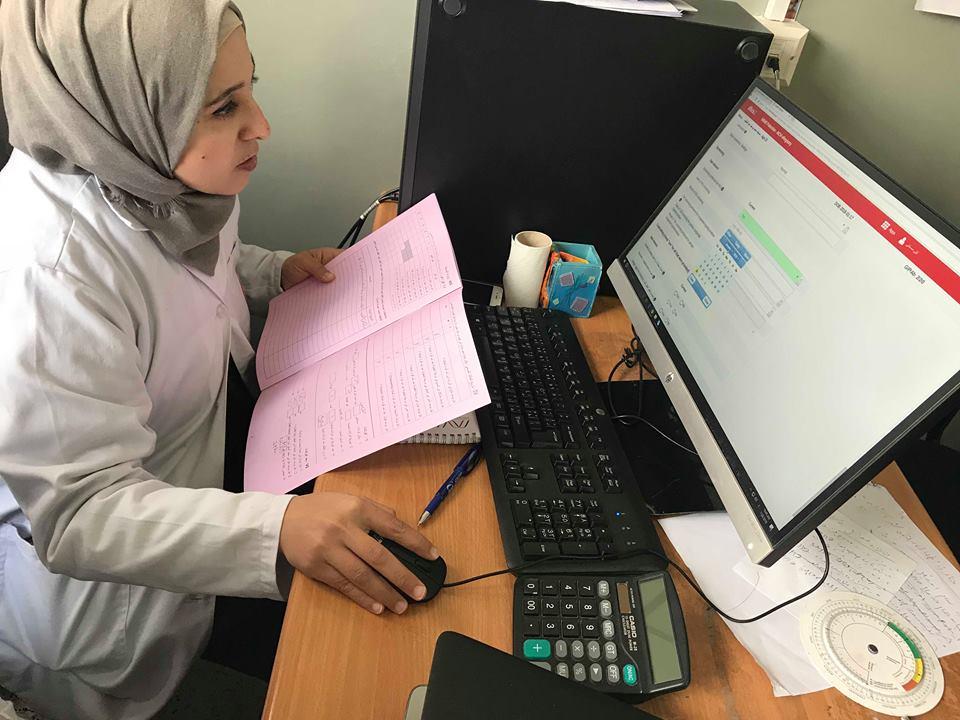A Window of Opportunity in Palestine
The eRegistry research project in Palestine is led by Frederik Frøen, a researcher at the Norwegian Institute of Public Health (NIPH), in collaboration with the Palestinian National Institute of Public Health, World Health Organization and the Palestinian Ministry of Health.

Main content
The first of the two cluster-randomized controlled trials of the eRegistry – the eRegQual study - assesses the comparative effectiveness of eRegistry’s interactive checklists with clinical decision support, and the existing paper-based recording routines (trial registration: http://www.isrctn.com/ISRCTN18008445).
The trial completed recruitment in September 2017 and follow-up was completed in July 2018; eRegQual is currently in the last phases of data collection. In the eRegTime sub-study, we are assessing the effect of the eRegistry on the time spent by the care providers on client care, documentation and reporting.
The second trial – eRegCom – is expected to begin autumn 2018. The eRegCom study is a trial of targeted data-driven communications to pregnant women and performance feedback dashboards to care providers.
Window of Opportunity
Frøen wrote in a Lancet Comment in 2013 that since 1990, there has been increased international focus on maternal and child health, which has resulted in the global numbers of maternal and child deaths being halved. However, the levels fall short of the Millennium Development goal of reducing maternal deaths by ¾ and child deaths by 2/3 by 2015. In the Comment, Frøen quotes another Lancet article where John Hopkins researcher, Neff Walker, states that progress towards these global targets is optimized by a “window of opportunity” whereby policies, infrastructure and funding all align.
Such a “window of opportunity” currently exists in Palestine and has the potential to ensure that the impact of this study’s eRegistry intervention will be sustainable.
Policy
- Aligning with existing national initiatives: The trials are embedded in the national strategy for implementing an electronic maternal and child health registry (http://pniph.org/site/article/27).
- Ethics, security and privacy: Ahead of the national implementation, researchers completed a study that mapped the legal, regulatory, and ethical landscape. They used a situation analysis tool tailored for the Palestinian context to identify gaps, opportunities, and actions necessary to ensure an ethical and lawful framework for the implementation of an eRegistry. This work was published in the Lancet 2018.
Infrastructure - Health-system strengthening
- Building on a previous relationship: While many countries do not have individual client registries, and use paper records to record health data, the researchers decided to undertake this trial with Palestine because of the relationship that has already been well established between organisations in Palestine, and both NIPH and the World Health Organisation (WHO).
- Drawbacks of paper-based health records: Paper records can only reveal rough overviews based on numbers and do not contain individual details. Information between different services is often not collated. Record keeping may not be consistent and comparable. Such data is seldom used for generating evidence for prioritizing resources.
- Use of best-practice routines: Electronic health registries driven by point-of-care data entry facilitate health worker compliance with established best-practice clinical and public health guidelines. Established best-practice clinical and public health guidelines may be enhanced by easily assessable, easily updatable, customized checklists of care and clinical decision support based on the latest research findings and policy guidelines.
- Automated reporting: The eRegistry consists of automated reporting dashboards consisting of standard monthly reports at the sub-national and national levels, potentially saving considerable amounts of time for the care providers.
- Communication strategies to pregnant women: Automated SMS messages to pregnant women, tailored to their health conditions and time of antenatal visit, are currently being tested and refined.
- Performance feedback to care providers: Care providers will receive periodic feedback on their own clinic’s performance with client care. These feedback dashboards are designed to be interactive and are currently being tested.
Funding
The eRegistry research project in Palestine builds on the results of a number of other large projects in electronic health registries, and mother- and child-health, including: “Harmonized Reproductive Health e-Registry”
ERC: In 2014, Frøen was awarded an EU Consolidator grant to improve the collection and use of health data in Palestine, in the aim of reducing maternal and child mortality.
This project also receives support from CISMAC.
